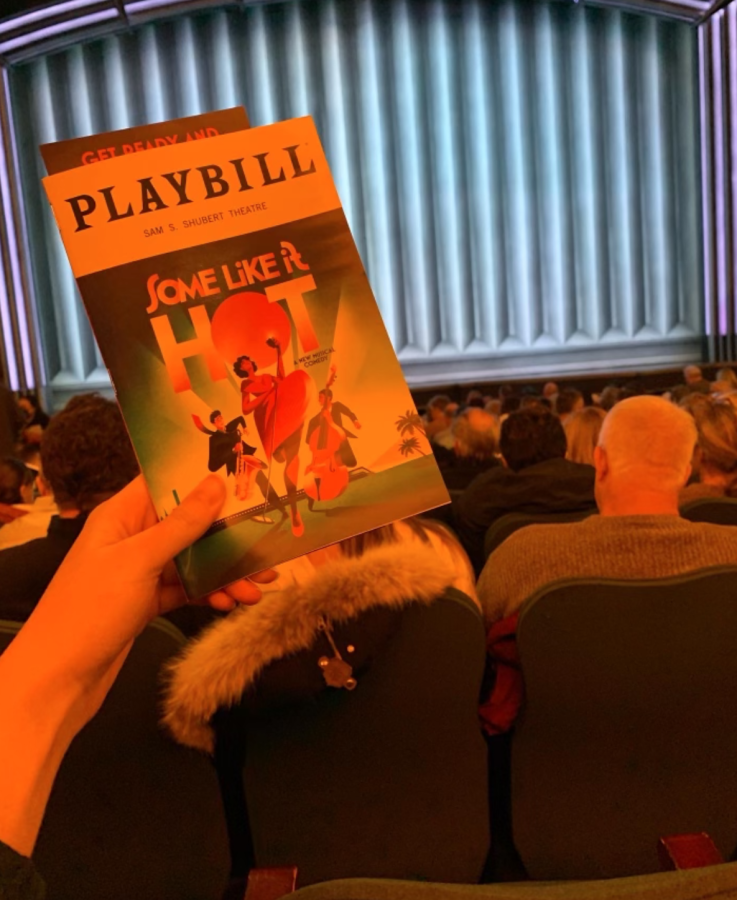Review: ‘Some Like it Hot’ Takes Time to Warm Up
A “Some Like it Hot” playbill. Photo courtesy of Marlie Kass.
What does a Broadway in 2023 look like?
How will it be able to successfully find its way out of a still post-pandemic slump with shows announcing their closing nearly every week?
That may likely depend on shows being able to meet a difficult challenge—somehow providing both theatrical magic and escapism while also acknowledging and staying conscious of a turbulent, ever-changing world.
Some Like it Hot, which recently opened at the Schubert Theater in early December, attempts to create a piece that meets this balance. And the show does get there, but it’s really not near the end of the two-hour thirty-minute musical comedy spectacle.
The result is good, but not great. Satisfying but not super spectacular. Yet, it is a step in the right direction.
Some Like it Hot is based on the 1959 comedy film of the same name, starring Marylin Monroe.
However, from the start, the concept was not to create a replication of the original, but rather an intentional updating of the themes and story of the movie.
And it’s obvious why this task was undertaken. Movie adaptations, especially those with recognizable names or stars, do well and are often a safe bet for Broadway. Some Like it Hot even boasts on its website that the show is “Hollywood’s Funniest Film […] Reimagined & Reborn as Broadway’s Great Big Musical Comedy.” Yet, the specific film was a somewhat risky choice from the start.
The story follows two musicians and brothers by choice, Joe and Jerry, who accidentally witness a murder by a powerful gangster. They quickly hatch a plan, disguising themselves as women, and taking on the new personas of Josephine and Daphne, as they join an all female-band headed across the country so they can eventually escape to Mexico.
Of course, complications arise as they try to hide their truth. Joesphine “Joe” meets Sugar, a talented if irresponsible singer and aspiring Hollywood star, and falls instantly in love.
Meanwhile, Daphne attracts the attention of an eccentric multi-millionaire desperate for companionship. From there, gangsters, musicians, and star-crossed lovers intersect over two acts of production numbers, each with as much glitz as the last.
If this plot doesn’t sound wholly unique, it isn’t, no matter how ground-breakingly unique the original film was. Just in the past five years, there has been discontent on Broadway twice as two musicals: Tootsie and Mrs. Doubtfire opened as adaptations of beloved films, yet those that center around a cisgender heterosexual man disguising himself as a woman for personal gain—a popular trope that many have pointed to as coming across as sexist and even transphobic.
The composers of the show, Marc Shaiman and Scott Wittman, are well aware of the task they were undertaking and even did a feature with Playbill.com, stating that “we’ve done the work.”
The team outlined how they tried to be intentional with their representation and story, not just across gender expression but racial inequality, casting black actors for the majority of the leads and addressing their identity within the script, all within the frame of a big, broad musical comedy.
Did they succeed? Mostly.
The weakness comes in the first act, which resorts to the usual tropes of such a story. Joe and Jerry disguise themselves initially for their own gain, and it’s awkward at first. Especially for Joe, where frequent jokes are made about how they appear as an older, less conventionally attractive woman.
Josephine and Daphne join in with the other women as they complain about what it’s like living in a man’s world—and at one point, Joesphine is the one who calls out the others for their behavior. Moments like this straddle the line between pandering and awkward or just seeming too close to where previous musicals failed.
And this is a stark contrast to the message of Act Two, where Daphne realizes they may feel just as comfortable as Daphne as they did with Jerry.
Despite not having the exact words to describe how they feel, it is explicit non-binary/trans representation on the Broadway stage—in a classical comedy, nonetheless!
J. Harrison Ghee, who plays Daphne, delivers their eleven o’clock number of discovery, “You Could Have Knocked Me Over with a Feather,” with tremendous heart, and the moment is done with the utmost sincerity.
From there, Daphne’s identity is completely accepted for the rest of the show by all, which while somewhat idealistic, is incredibly powerful. If this was only better set up by the first act, it could have been a truly groundbreaking theatrical moment.
Other than Ghee, Adrianna Hicks provides the standout performance as Sugar, standing out mostly through her dynamic, stunning singing. Christian Borle, meanwhile, is charismatic as ever as Joe, although he does feel slightly typecast in a role very similar to those he’s played before with nothing really to distinguish it.
Overall, the production elements of Some Like it Hot are good, but they’re not innovative enough to be outstanding. The music is enjoyable but not extremely memorable. The show relies on a strong ensemble of tap dancers, who provide entertainment, but eventually become somewhat repetitive, with longer and longer sequences as the show progresses. The sets and costumes do their jobs, with some stunning pieces, but again, nothing out of the norm for a screen-to-stage adaptation.
Finally, the show is full of one-liners and classic slapstick tricks, but compared to previous works created by the creative team, for a pure comedy, it’s just so-so.
While Some Like it Hot may not be the perfect show, it is certainly an indication of the direction Broadway could and should be going in, and does thankfully provide a glimpse and a stepping stone to an exciting, more inclusive future.






















































